Last week, I posted the first half of my interview with Jay Ferguson, creator and director of the web series Guidestones. That article can be found here. This week, Jay and I conclude our discussion about Guidestones, web series, and the film industry in general.
MD: Here at Cheese-Magnet, we are fans of the B-movie genre and use the term lovingly but there is a certain stigma associated with it. How would you classify yourself and your work? Are web series the new B-movie?
JF: That’s an interesting point. I’ve never thought about that. But I said to somebody recently, does anybody make low budget feature films anymore? And they said, nah people make web series instead. B-movies in many ways were the low-budget feature films, right? Obviously they got the classification of being a B-movie because they didn’t have the oomph of the A-movie, whether it was the slick polish, or the big names, or the support to make them big. And then they become B for, I guess, their flaws I suppose. Which we look back on and enjoy those flaws in many ways and then start to emulate them, right? Yeah, I think it is kind of like a B-Movie world right now.
I talked earlier about this experience of seeing Star Wars and having that affect my life. To me in many ways just sort of philosophically when I look back on it, I think of Star Wars as the movie, or maybe it was Jaws, or maybe it was both of them, where the B-movie became the A-movie. They were both B-movies, right? I mean they were made by these two guys who were just B-movie guys. They were trying to make B-movies essentially and they did it with such creativity and smarts and art and just hit at a right time that it sort of flipped everything. So the A-movie, which was the dramatic powerful drama or whatever, sort of slowly devolved into some other place, relegated to some other place as opposed to being at the leading edge. So I think that in many ways it’s hard to differentiate between A and the B. But I think that certainly it’ll be a very B-movie feel now. I’ve seen online projects in development right now, projects that will be coming out in the next couple of years, science fiction and stuff like that, that play on the B-movie sort of idea. They don’t try to hide their lack of resources. They kind of play them out. I don’t know. I think that our whole industry is shifting that way. It’s hard to tell what’s A and what’s B any more. Is Guidestones a B-movie? It doesn’t really take after a B-movie it takes after more of an A-movie look but in a B-movie category maybe. Was thriller ever sort of considered an A-movie category? I don’t know.
MD: Are you referring to the thriller genre?
JF: The genre.
MD: Well, it’s got kind of a film noir type of feel to it, right?
JF: Yeah, yeah.
MD: Guidestones has a bit of that.
JF: Totally. Yeah.
MD: I think of that as somewhat B-movie-ish.
JF: I agree. I totally agree. These are movies that were made for very little and not even necessarily with big talent attached or anything like that. It was just they ran out and made them quick.
MD: I find it interesting what you’re saying about the shift in the industry. They’re doing big budget grindhouse now. But also you’ve got people who are playing up on the fact that they are B-movie or were B category actors. Shatner is a perfect example. He’s this kind of hammy guy and for a while he seemed very serious and had a reputation of being rather arrogant. But now he’s completely spun that around and really embraces his B-ness and is a bit of a goof and is being loved for it. I find there’s lot of people doing that type of thing. The love for the second tier is growing and you want to be that second tier. You want to tell everybody that you’re a part of that.
JF: Right. Yeah, yeah, totally. It’s an interesting point. It’s hard to tell and I think it’s kind of like you’re saying with the grindhouse. I mean that’s a really good example. Ok, here we’re going to kind of make this sort of B-movie content but we’re going to give it an A-movie polish. Which you can do more and more but which to me is kind of the bulk of the movies that are out there now, you know? I mean not the bulk but that’s what Star Wars was right? It was like a B-movie genre picture that should have been played in the drive-in for a weekend with this incredible polish and it just like ‘Wow!’ It explodes.
MD: The buzz is that YouTube is going to start charging for ‘premium content’. What are your thoughts on that plan and how do you see it impacting your ability to make your product accessible?
JF: Everybody’s trying to figure out how to monetize. I mean really, at the end of the conversation, there has to be money. It’s really hard to produce the stuff unless you’re just doing it purely for your own passion or for your own creative reasons. With the business that we are in, it’s hard to do that. It’s hard to create fiction in particular. It’s one thing to sit there in front of your camera. You can write something and then do a vlog. Okay, fair enough. That’s cost effective in many ways. But if you want to create fiction and you want to have actors and you want to write scripts and shoot it ultimately it starts to take money. So there has to be money somewhere. I’m all for giving away the content for free. But the problem is, if there’s no other way to generate revenue, there ain’t gonna be any content. I think one of the reasons why there isn’t a huge amount of web-based content right now, I mean there’s a bunch of it out there but not good quality stuff, is because of the lack of money. And I think that will always be the situation.
I know that YouTube and Google and any kind of platform out there that distributes the stuff is trying to figure out desperately how to monetize it. It seems like the advertising revenue has been slow in coming. The online advertising brings in vastly inferior quantities compared to television for some reason which I still find mystifying. But the fact is YouTube’s trying to do this thing right now where certain content will cost money. Is it any different from going to iTunes to rent a movie? That’s how I watch a lot of my movies now. I rent them off of iTunes or Netflix, which is a subscription based platform. I’m still paying money for my content. A lot of people are. The question is, for web series, will people actually pay for it? That’s a good question. I think that people will if it’s easy. If there’s some premium content on YouTube and there’s a very easy way to buy it. The problem is that if we charge people for Guidestones, it’s such a barrier to entry. I’ve got to get out my credit card. I’ve got to fill out a thing. I forgot to put this date. <Laughs> You know what I mean? It’s like a real royal pain so people aren’t going to do it. But maybe if it was easy like when I go to iTunes and I just buy something. I don’t have to go through a process necessarily.
So on the one hand, I would ideally love to support all content like Guidestones with brand partnerships and just have brands pay for it and then give it away for free. But that’s not there yet. There isn’t enough government financing to do it and that’s not my first choice…but it is a choice. Maybe having to charge for it is a way to finance it. Maybe it’s a combination of all three. Probably that’s what it is. Did that answer the question?
In a way, for content creators, this is actually a good thing moving forward. It might not be as good for the audience but it’s actually good for a content creator. And I’m both those things. I’m a content creator but also I’m a viewer. So I may be a little bit more ready to pay for certain services. Like for music I’m on Rdio, which, to me, is amazingly convenient. I can pay eight or nine bucks a month and have endless access to music. I’m fine with that. But again it’s this constant struggle. You see it happening in newspapers. Of course everybody quotes The New York Times right now as having success in terms of putting up a pay wall and people having to pay for content. They tried it once and it didn’t work. Then they went back and they started again and it seems to be working. Now the Globe and Mail is trying to do it where there is this middle place where you can read so many articles a month but then eventually you’ve got to pay to see more. So I think that the reality is going to be that, on all these places where content is available, we will see these pay walls slowly start to come up. I don’t know how long it’ll take but they’ll come up and they’ll fail and then they’ll come back in again and they’ll figure out new ways but eventually there’s got to be a generation of money. If Netflix was free, there’d be no content on it.
MD: The second season of Guidestones was officially announced back in June 2012. How is it progressing?
JF: It’s progressing. I would say that the scripts will all be done within the next month or so. The scripts are really coming together, which is great. It’s been a long journey on the scripts because it’s been a busy winter. Everybody’s been very busy and the scripts are quite complex and the formats slightly changing. It’s coming along well. The summer will probably be spent doing a lot of pre-production and then we’ll start shooting at the end of the summer and the beginning of the fall. Yeah, it’s coming along. I’m excited. I can’t wait to start shooting again.
MD: You just mentioned that you will be changing up the format a little. What can the viewers expect?
JF: There will be fewer episodes and they’ll be longer. So what we talked about? How we were both just singing the praises of the short episode? I had decided on that length based on the analytics of average attention spans three years ago or however long ago it was. That’s changed. Attention spans are getting longer and there is a general move towards video being longer online, especially dramatic content. Again this is based on feedback from fans. People said, “I get into it and I love it and its short but I’d be happy to be there for a bit longer.” Now, I think there’s always value in leaving the customer wanting more and I hope I don’t botch it by making them longer. But, we’re going to keep the pace. We’re going to keep everything going. We’re just going to make them a bit longer. So there will be fewer episodes and they will be about twice as long.
MD: When season one ended, there were a number of loose ends. Will season two address those or is it more your style to leave some things to the viewers’ imagination?
JF: The second season is going to take off exactly where the first season ended so a lot of those loose ends and those ideas will actually be played out throughout the second season.
MD: Without giving anything away, the story in season one progressed down a very specific path that some might say will be difficult to either continue down or pull back from. How do you continue the story without alienating the existing fan base?
JF: Are you talking specifically about the relationship between the two main characters?
MD: That’s a major part of it, yes.
JF: That will be played out as it is. It will take off exactly from where it was. It’s actually quite interesting what happens now between the two protagonists. For those who have seen the show, you understand that at the end the relationship between the two protagonists is quite complicated. For those of you who haven’t but will watch it I’m not going to say anything. But we take off from where they left off and let’s say they exist in sort of parallel realms for a while and then we bring them back together. I wish I could be less vague. <Laughs>
MD: Speaking of the fans, you have put some effort into cultivating a strong relationship with the fans through things like the Guidestones Get-togethers. How important is going beyond mere viewership and trying to create a community?
JF: For us it’s totally key, actually. Our community is key and, I would have to say, that in many ways that’s where we’re struggling the most. We would like to build our community. We would like to have more people in. For us there are lots of different reasons. That’s where all the good ideas come from, honestly. Having a community really is helpful and from this side of the community we really love it. We get great ideas and feedback and it makes us better at what we do. I think of the people who are watching the show as equal partners in the process. Look, I’ve been in this business for 20 years and I’ve spent a lot of my life making content that nobody saw. Seriously. I mean content that just got stuck on a shelf somewhere. Not because it wasn’t good necessarily but because it didn’t have distribution or for whatever reasons; stuff doesn’t get seen or it gets seen very, very little. To me that has always been a failure because we created it to actually connect with somebody. That’s why you create something. That’s why we obsessively try to make something that’s going to reach an audience. So to me the whole idea of having a community is totally key to the process. People interacting and talking about it just helps. And then it becomes a conversation as opposed to just a monologue. Having an active community also helps us spread the word out there and get it seen by more people. It’s hard. It’s really hard when you don’t have tons and tons of marketing money to get the word out there. I think the thing about Guidestones is that still very few people know about it. It really is still small. We have decent numbers for sure compared to any web series but we could use more. We can always use more. Having an active community helps spread that.
MD: You said you think the community might be where you’re kind of failing. Do you have any plans for trying to build it up?
JF: We’re trying. We are definitely trying. We are doing everything we can. Again, we don’t have a lot of resources but we’re trying to build and get the word out there and constantly push. Probably what I’m beginning to realize in terms of the business side of this stuff is that, like anything else in the media world, you’ve got to have distribution. You’ve got to have somebody pushing you. You can probably do it on your own if you have a very large sum of money to go out to promote it. But, if you don’t, you need somebody who has the network to do it. So, i.e. television or whoever can get it out in front of people. That’s what we need more than anything is to have distribution, somebody helping us push it.
MD: Where do you see yourself going? Do you see web series as your niche or is this a stepping stone?
JF: You know, I would love for it to be my niche, actually. I really like it here. I really do. If I had my way I would be happy to stay here and produce content. The funny thing is, what does a web series mean? If I was able to put together thirteen half hours, is that a web series? If it’s on Netflix, is it a web series? Is the new Arrested Development a web series? I mean, it’s hard to say. So I think that I would really like to continue making content in whatever form that takes. I would like to be distributing it in the way that we are distributing it because I think it’s a very interesting way to distribute. Everyone is always like, “Well what about going up and taking this to television?” I guess I wouldn’t say no to it if that was the only way we could finance it. Again, it’s going to come down to financing. If we’re able to finance it and we can continue to finance it and distribute it with partners in the way that were doing then I would love it. I really believe in a new model of doing this stuff and I’d like to continue to be doing it in a new model because it is liberating. But we still need all the right partners. So it’s not easy. It’s a hard answer to say but I’d like to be here.
MD: I notice that Guidestones is listed on the Internet Movie Database but it’s listed as a TV series. They don’t have a web series category.
JF: Like, we’re not even categorizable! It’s amazing. No, it’s true. So this is one of the things we’ve been having problems with. We’ve created this thing that’s really cool but it doesn’t fit into a specific category on anybody’s radar. For instance, we had a publicist recently trying to reach out to media and the media is struggling with who we are. The movie guys are, “You’re not a movie.” and the TV guys are, “You’re not TV.” and the technology are, “Well, you’re not really technology.” We don’t fit into a category. Even on IMDB, none of it fits into a category. But I think that more and more these days that’s what you’re going to find. There’s going to be less stuff in categories. We’re all struggling with that. It’s a huge struggle for us for sure.
MD: I just wanted to wrap it up by asking you what you think is the real story behind the Guidestones monument?
JF: So much of what I think about the Guidestones I poured into the actual show, the actual series. It’s kind of one perspective or idea. I’d say you’ve got to watch Guidestones and that’s exactly where you’ll find out what I think about the Guidestones.
MD: You’re going to have those conspiracy theorists after you.
JF: <Laughs>
Check out Guidestones at guidestones.org.

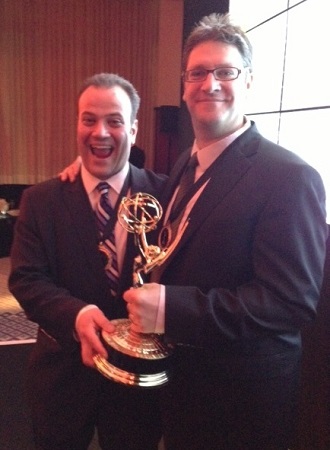
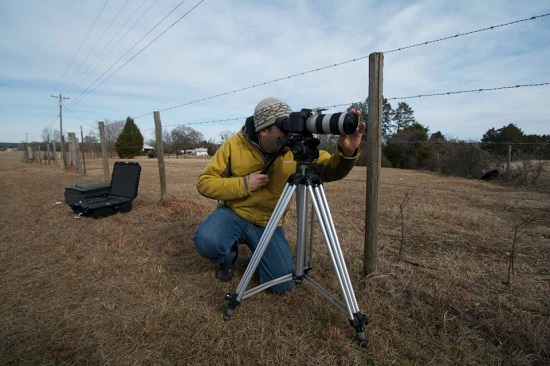
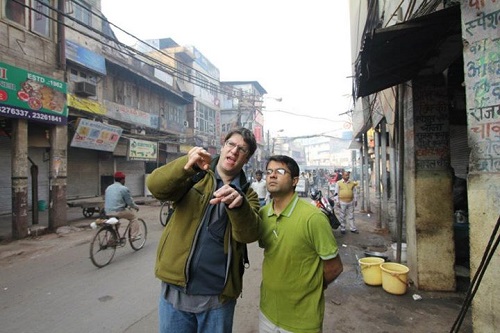
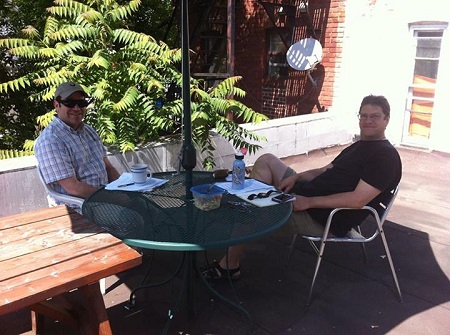
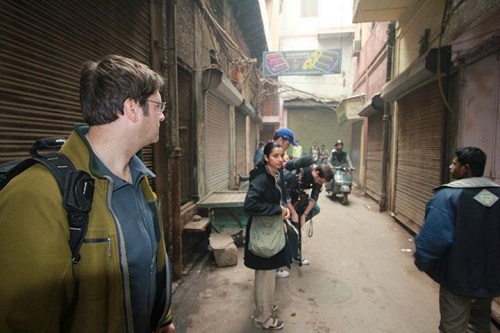
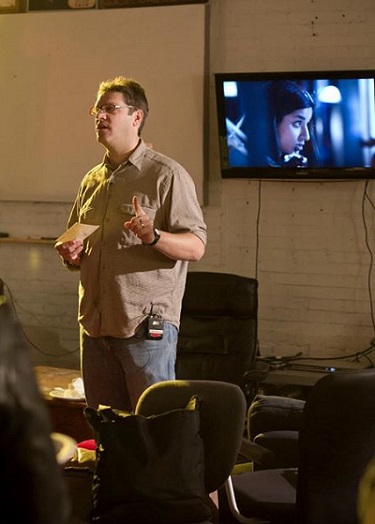
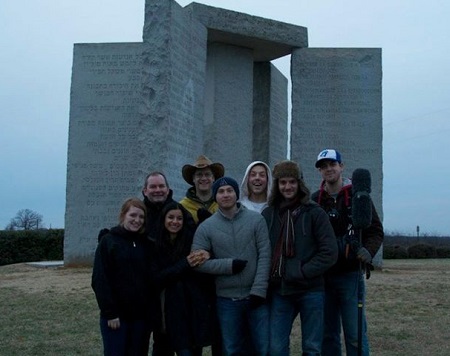
There are no comments